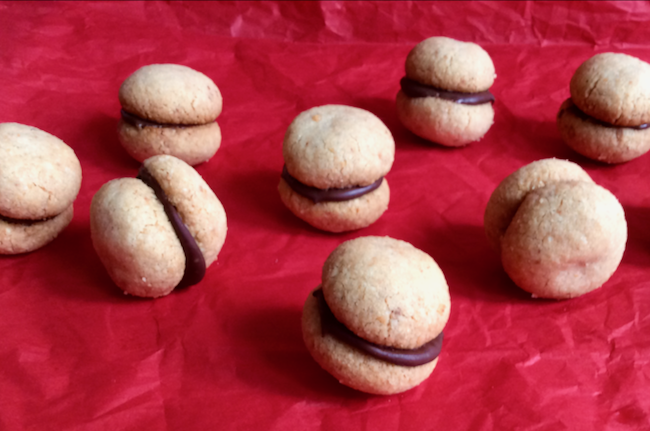Ohohohoh ohhhhh … these are perfect little Christmas cookies. Light and crumbly, chocolate and hazelnut, a match made in heaven. Baci di Dama, which is Italian for lady’s kisses. Definitely my Christmas Cookie of the Year for 2018!
I based the recipe for Baci di Dama cookies on one from America’s Test Kitchen, with several updates and upgrades based on my experience with the recipe and other inspiration I found online.
Despite how fancy these little chocolate hazelnut cookies look, they’re ridiculously easy to make in the food processor, and the dough is quick and easy to shape and bake.
The biggest upgrade I’ve made to the recipe here is the addition of lemon flavoring to enhance the chocolate and hazelnut. I really love King Arthur Flour’s baking flavoring called Fiori di Sicilia, which is a combination of citrus and vanilla extracts. Just a small amount of this magical product makes whatever cookie or cake you’re baking, even the simplest butter cookie, taste just like Italy. Plus, it makes the kitchen smell divine. If you don’t have Fiori di Sicilia (and I recommend that you pick up a bottle; it keeps in the fridge forever), then add a few drops of lemon extract or 1/2 teaspoon freshly grated lemon zest to the cookie dough. Amazing.
Resist the temptation to make these little lady’s kiss cookies bigger than indicated in the recipe: they’re so perfectly teeny as is.
Baci di Dama (Italian Chocolate Hazelnut Sandwich Cookies) Recipe
makes about 2 1/2 dozen
1 cup blanched hazelnuts, toasted
1/2 cup all-purpose flour
1/4 cup granulated sugar
2 tablespoons cornstarch
1/4 teaspoon salt
5 tablespoons cold unsalted butter, cut into 1/2-inch dice
1/2 teaspoon vanilla extract (see Note)
1/2 teaspoon finely grated lemon zest (see Note)
1/3 cup bittersweet or semisweet chocolate chips
Preheat oven to 350°; line 2 baking sheets with parchment. In a food processor fitted with the metal blade, combine hazelnuts, flour, sugar, cornstarch and salt. Pulse 8 to 10 times until the mixture is finely ground and starts to form damp clumps. Add butter, vanilla and lemon zest and pulse until the dough forms a mass, about 30 seconds. On a countertop or pastry cloth, form the dough into a ball; use a bench scraper or knife to divide into quarters. Roll one portion of dough into a rope that's 1 inch in diameter. Use the bench scraper or knife to cut half-inch pieces; shape these with your hands into small balls. Place balls on lined cookie sheets 1 inch apart. Repeat with remaining dough. Bake until cookies are lightly brown, 16–18 minutes, rotating baking sheets halfway through baking time. Let cool on baking sheets.
Use a microwave or double boiler to melt chocolate chips. Spread a bit of chocolate on the flat side of one cookie, then top with another, pressing lightly together. Repeat with remaining cookies. Store in an airtight container at room temperature or in the freezer for a couple of weeks.
Note: These cookies have superior flavor when you use 1/2 teaspoon of Fiori di Sicilia lemon/vanilla extract. If you don't have that, use 1/2 teaspoon vanilla extract plus a few drops of lemon extract, or 1/2 teaspoon vanilla plus 1/2 teaspoon finely grated lemon zest.







I tried to comment on the Overnight Coffeecake recipe but there is no option on that page.
Alma was my “other mother” growing up in Indianapolis. She was my mom’s best friend so I spent a lot of precious, powerful moments with her in and out of the kitchen.
Her example is actually one of the main reasons I became a cook for a living in Covington, KY.
I use many of her recipes still and it thrills me that you knew her and share her recipes too.
Thanks for all your wonderful dedication and work to the culinary world.
Wow, Patrick — small world! I have hazy memories of Alma from when I’d go with my Grandma to Second Presbyterian Church, where Alma worked. I remember her as strong, sturdy and kind-hearted. Thanks for sharing! And good luck with your culinary work right across the river.